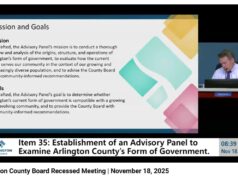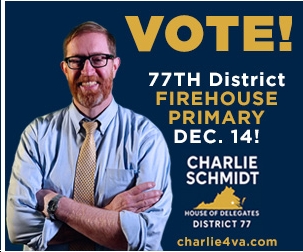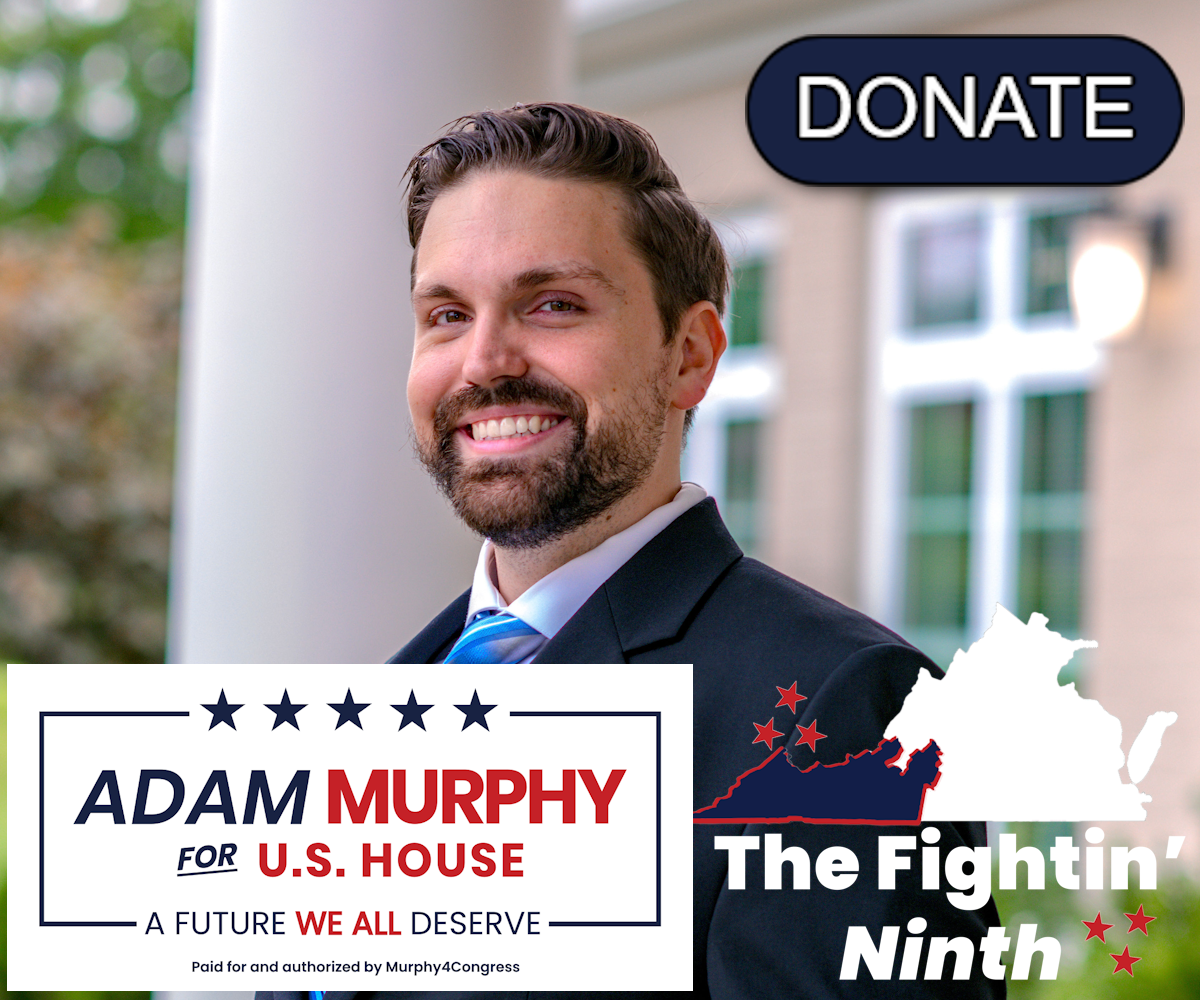This past Monday, I had a chance to sit down in Leesburg with the Democratic nominee for Loudoun County Commonwealth’s Attorney, Buta Biberaj, for an on-the-record interview. As I wrote recently, Biberaj is super smart, and she understands the balance between making progressive criminal justice reforms while of course protecting the public and advocating for victims. I strongly encourage everyone to support her in the general election, presumably against Republican Nicole Wittmann (current Chief Deputy Commonwealth’s Attorney to Loudoun County Commonwealth’s Attorney Jim Plowman).
As for our interview, it was a couple hours long – and thanks again to Buta Biberaj for her time! – covering a WIDE array of topics, some more specific to Loudoun County, but most of which have come up frequently in other Virginia Commonwealth’s Attorney races this cycle, including in Arlington/Falls Church and Fairfax County. Personally, I think it’s very interesting to compare and contrast Biberaj’s thoughts on an array of subjects, including:
- seeking the death penalty – or not
- “prosecutorial discretion” (how much should there be? should a Commonwealth’s Attorney just unilaterally say they’re not going to prosecute certain laws)
- racial disparities in the criminal justice system
- prosecuting (or not) for marijuana possession
- “discovery” – how open should it be?
- cash bail – when (if ever) it should be used
- the importance of courtroom and managerial experience to being qualified for this position
- the Commonwealth’s Attorney as most definitely NOT one who sits at the desk, but actually getting in the “trenches” by being in the courtroom frequently
- cooperation – or not – with ICE
- the civil asset forfeiture system
- the amicus brief regarding Gov. McAuliffe’s restoration of rights to ex-felons
- views on running for office
- how the current Loudoun County Commonwealth’s Attorney’s office is doing and what needs to change
- views on her Republican opponent
- what the main job of the Commonwealth’s Attorney should be – protecting the community and preventing crime? advocating for victims of crime? reforming the system? other? all of the above?
Given that the interview covered so much ground, I’m going to do this in several blog posts. Friday, in Part 1, I focused on who Biberaj is, her reasons for running, her views on what the main job of and qualifications for the Commonwealth’s Attorney should be, and also her views of her Republican opponent. Yesterday, in Part 2, the focus was on prosecutorial discretion, racial disparities in the criminal justice system, the “discovery system,” and the role of the Public Defender’s office vis-a-vis the Commonwealth’s Attorney. Today, I’ll conclude by focusing on some hot-button issues: the death penalty, cash bail, cooperation (or not) with ICE, civil asset forfeiture, the 2016 “amicus brief” regarding restoration of ex-felons’ rights.
By the way, I gave Biberaj a chance to review the transcript of our interview for accuracy, and have incorporated her (very minor) edits. Finally, I’ve added bolding for things that particularly jumped out at me. Enjoy!
P.S. I was struck by how much I agreed with Biberaj on pretty much everything she said. The bottom line is that I am very much in sync with her regarding the Commonwealth’s Attorney job, its qualifications, etc, etc.
Blue Virginia: What about the death penalty? That’s on the books in Virginia but you know some comments attorneys do seek the death penalty and others don’t sometimes some seek it rarely in the most heinous cases. What’s your view on that? I mean would you if your CA, if elected you know would you seek the death penalty and ever
Buta Biberaj: “I can’t give you a definitive answer, would I ever seek it ever. Because think about how the facts might play out. I’m also a geek when it comes to this. I am a firm believer that God tests us – the minute you say you will never do something, you’re gonna get challenged and you will have to change that response, because something happened that you didn’t envision that has to do with it. The death penalty, that is the law. It has to be used very limited, and here’s a couple of reasons why. One is obviously the facts have to qualify. The community has to be in a position where they endorse that, because at the end of the day you are representing your community’s standards – the community has to be behind that because that is who you’re representing…So yes it’s the law, but you represent your individual community as well, and that gets borne out with the jury….the jury will speak to that issue….The other part that we have to be mindful about is the imperfections of the system. So if you have a good CA, you have a good defense attorney, you have a good law enforcement, a good judge, the chips are gonna fall where they should. If you have anybody who’s lying, cheating, stealing or cutting corners, or they’re inserting what they believe should be the outcome that’s when bad things happen. You talked about how imperfect the death penalty is, and we know it because we have innocence projects. How do these people get convicted of a capital offense, get sentenced to death and then it’s proven they’re not guilty, it’s possible they didn’t do it, it’s oh my god they didn’t do it. Because of that we have to be very mindful as to how we use it because I can never undo that’s…death is final…”
Blue Virginia: But you’re not absolutely ruling out ever using the death penalty?
Buta Biberaj: “I don’t think you can, because god forbid and may we never be so tested, how horrific can something be or can be? I’m not a proponent of the death penalty…I can also speak to you about Loudoun County. Since I’ve been an attorney in early in 1993, early in the 1990s, there was a case that was a capital case and it got overturned because the prosecutor’s office what they end up doing is they violated Brady… and then it got commuted to a life case…but this is the only time we’ve ever had in my experience, in my 25 years, a capital case. The current office has had a charge that started out as a capital case and then they pled it out to life in prison…For some people being in prison for the rest of their life is a hell of a lot worse than then death…For families of victims, they may not want the death of someone else on their conscience…You hurt somebody in my family, I’m thinking I’m going to kill you. When the time comes, do I really want that added burden, do I wanted that added guilt, does it really give me closure? That’s why you have to invite the families…they have to have some input…because at the end of the day, this is the victim aspect, they’re the ones that we have to start with healing and then it goes to the community and all these other things. It’s just more of a global perspective because it’s easy to check that box, but what are you really doing?”
Blue Virginia: What about cash bail; what do you think about that? Should it ever be used should it be scaled back what would be a better system than cash bail?
Buta Biberaj: “In Virginia, the cash bail system by statute is very appropriate. It’s for somebody who’s a risk of flight or an unreasonable danger to the community. If you don’t hit those two categories you should not be forced to post a bond.”
Blue Virginia: But if you’re poor and you can’t afford the bail, is that discriminatory in some way, if you’re poor you have to sit in jail?
Buta Biberaj: “This is where it becomes discriminatory, because those two elements are not being met. Because everything could be based on safety. You went out and you stole; the property of our community is at risk, we shouldn’t let you go. For real? So those are things where we have to just be mindful, what safety standard are we using? The fact that you made a bad decision yesterday, I can’t guarantee you won’t make a bad decision tomorrow. That’s not the standard. Is there evidence to actually support that I am an unreasonable danger to the community or to myself? In that situation, where cash bail is being misused is this, you are not an unreasonable risk to the community, but because we have it in the way our system has been set up and been systematically used, we feel like you have to have some skin in the game. So I’m going to put a $5,000 bond on you. $5,000 bond, you can either pay at all you get it all back or you pay 10%, which is 500 bucks. 500 bucks may not be that big a deal for you, but you know what for people in our community it could be their car note, it could be part of their their rent or mortgage, it could be the food that they put on the table for their children. So that’s what we have to be mindful of, what are you spending that $500 for. Studies actually show when some states have gotten rid of bail bond, their compliance has actually increased. Because I, the accused, get to keep my job; I don’t have to make these bad choices of do I skip work…and ‘ll tell you this, I’ve had thousands of clients but I’ve had fewer than five total, fewer than five ever not come back to court…People at the end of the day are okay with processes that they have faith and trust in. It’s like consequences; you go to work and if you haven’t done your job and boss calls you in, you go to his office and deal with it…
Blue Virginia: So would you would you ask for cash bail if you’re elected?
Buta Biberaj: “No. I would not be promoting that in cases where we don’t need to have it. We don’t need to supplement the bail bond system and we don’t need to supplement a system that as we talked about is systematically hurting those who are less financially stable. We don’t need to break people. Because the other thing that happens is if you hold them in custody pre-trial, you’re not getting the right outcome, you’re not getting the just outcome, I’m not getting somebody who’s pleading guilty because they’re guilty, I’m getting someone who’s pleading guilty to get the heck out of jail. So those are things that we have to look at – if your job as a prosecutor is for justice, you’re not at the end of the day getting justice. And if you’re using those processes to leverage, you’re doing an injustice to the community and then we lose faith in our system; we don’t want to lose faith in our system. Everybody comes through those courtroom doors should feel like they’re okay to have their day in court.”
Blue Virginia: That’s a good way to put it.
Blue Virginia: What is your view regarding the Commonwealth’s Attorney’s cooperation level with ICE? Should it be increased, kept about the same or scaled back?
Buta Biberaj: “In Loudoun County, I believe our Sheriff’s Office has an agreement with ICE, where upon arrest they report it. Then it goes to court, they report the disposition. If they’ve been sentenced they report that. So ICE has an opportunity to, upon any arrest to lodge a detainer and then obviously upon your release and…sentencing they have those opportunities. I believe by law or agreement, it is up to three days that they can hold somebody, because before that, it was somewhat indefinite, which is unconstitutional in my opinion. Because you as a government if you’re gonna act, act. But if you’re not, you can’t hold somebody like that – maybe I will maybe I won’t, that’s just not appropriate on any level…I don’t know what our role would be to cooperate with them, because that is not a function that we have…If you have somebody who is charged with something and they are undocumented, I think they should go through the process just like any documented person, so that they come before the court and if they’re guilty then there should be consequences, have their sentence and then we, as the local community, are done with them. Then ICE can come take their place. If they come before the court and they’re acquitted then that’s between them and ICE. But it shouldn’t be for us to be able to infiltrate that because as a county we don’t have jurisdiction to do so outside our cases. Also, we have to be careful how we effect our victims of crimes, because if we become as a community overly active on the enforcement of immigration…if it looks like to individuals that you come to court as a witness you might be subject to being snared by ice, you’re not coming in….if you, as a victim come in and will be picked up by ICE…you’re not going to report it…maybe, they start thinking I will take the beatings and the emotional trauma but at least I get to stay here for my kids, it’s a horrible situation. So there’s no perfect exact answer, we just have to get more community focused and say what is the better outcome for our community.”
Blue Virginia: What is your view of the civil asset forfeiture system?
Buta Biberaj: “The U.S. Supreme Court just said that if you’re going to forfeit somebody’s property, it has to be commensurate with what their crime was. So if you go out and you sell one time, a hundred dollars worth of marijuana, I should not be able to take your $30,000 car. Those are things that you have to be mindful, when are you over exerting the power of the government…it becomes somewhat of a self-indulgent aspect of using your discretion. We’ve had cases here where we had the guy who’s in charge of our asset forfeiture whose embezzling; there’s no oversight or anything of that nature and that’s all I think in the responsibilities of the sheriff as well as the prosecutor’s office to have had that oversight, and they didn’t. We have property that has been taken from our citizens at the start of the case….we’ve taken your phone, we’ve taken your clothing, we’ve taken or maybe we’ve impounded your car, but maybe we never go through the civil forfeiture but we keep it as evidence, the case has been done for years and years. Why do we not return it? So those are things that in my mind I want to clean up. We don’t have the right…if it is a direct result of a crime, different conversation, and then you go through the process…but you can’t do it extrajudicially. That is no different than the government stealing from our citizens.
Blue Virginia: This has come up in both the Fairfax and the Arlington Falls Church races but if you had been Commonwealth Attorney back in I guess 2016 when Terry McAuliffe was doing his ex-felon restoration of political rights would you have signed on to the amicus brief that was, Plowman actually was the author, I believe, or his name was on it.
Buta Biberaj: “I would not have. I think the guns [issue] is a red herring. But it was your civil rights, your right to be on a jury, the right to be a notary and the right to vote. So if we’re talking about having excluded individual from our communities because they were convicted felons when you come out, what do we want you to be?”
Blue Virginia: A good citizen reintegrated into society.
Buta Biberaj: “Yeah, we want you to be invested in the community. But because you have the felony conviction you’re not getting a job, you’re not getting housing, you can’t vote you can’t you can’t you can’t. So how do we expect you to be a contributor? We don’t. That I think is a core problem of the recidivism part. We don’t have that person rooted back in our community, so there’s an investment for them. So if we can get you to the point where you can say that you are active in your community, you paid your dues to society. As far as a juror, guess what, everybody gets to ask a question, anybody here have a prior criminal conviction? Who has access to the records of all these jurors? The prosecutor, not the defense attorney. So you can’t say that you as a prosecutor are being duped by having any of these individuals without you having the opportunity to vet them. The other thing I think that came out during that time frame, this is my bias, is that I thought it was more politically incentivized because the assumption was that only Democrats are convicted felons, we don’t have any Republicans that are convicted felons…so when they come out and become voters, look what happens. Trust me, I have represented many Republicans and can say, political party is not determinative of the commission of crime. I think there are 40 states where you get your rights back….From what I hear, none of them have seceded, none of them have folded…We can do the same thing, I would never have signed off on that amicus brief because it hurts our community.”
Blue Virginia: In both of the races up here in Northern Virginia, both of the incumbents argue that they totally support restoring ex-felons voting rights that’s not that’s not the issue they said they signed because of the process that McAuliffe was unconstitutional the way he was doing this…
Buta Biberaj: “It makes it a conversation point. So you’re somebody who had their rights taken away twenty, thirty, forty years ago; oh, you mean I can get them back? A lot of people just don’t have the savvy or knowledge to know that they can be reinstated. It’s not that you just got out yesterday, but you’ve been living and contributing every other way but that way for decades and you didn’t know you could. It’s a great conversation point. Gov. McAuliffe’s actions were not unconstitutional, they were novel to Virginia.”













![Christmas Day News: Zelensky’s Christmas Wish (“May [Putin] Perish”); “Is Trump mentally OK? A look back at the president’s unusual behavior in 2025”; “Trump Fires Off Unhinged Merry Christmas Message to ‘Scum’” While Biden Wishes “peaceful and joyful Christmas Eve filled with love”](https://bluevirginia.us/wp-content/uploads/2025/12/montagechristmas0225-100x75.jpg)
![[UPDATED 12/24] After Dept. of Interior Puts Hold on Five East Coast Offshore Wind Farms, Including Coastal Virginia Offshore Wind, VA Senate Majority Leader Scott Surovell Rips “Trump’s blatantly illegal political payback to VA for voting for [Abigail Spanberger]”](https://bluevirginia.us/wp-content/uploads/2025/12/surovellwind-100x75.jpg)
